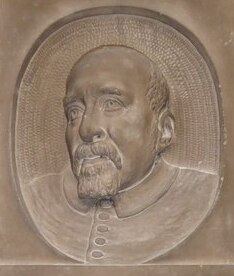Robert Recorde
Welsh physician and mathematician
Robert Recorde (c. 1512 – 1558) was a Welsh physician and mathematician who is best known for introducing the equals sign (=) in mathematics. He was a prominent figure in the development of mathematical education in the Tudor period and made significant contributions to the field through his writings and teachings.
Early Life and Education[edit | edit source]
Robert Recorde was born in Tenby, Pembrokeshire, Wales, around 1512. He was educated at the University of Oxford, where he became a fellow of All Souls College. Later, he moved to the University of Cambridge to study medicine, earning his degree in 1545.
Career[edit | edit source]
Recorde's career was marked by his dual interests in medicine and mathematics. He served as a physician to both Edward VI and Mary I. Despite his medical career, Recorde is most celebrated for his contributions to mathematics.
Mathematical Works[edit | edit source]
Recorde wrote several influential books on mathematics, which were among the first to be published in the English language. His works were designed to make mathematics more accessible to the general public.
- The Grounde of Artes (1543) was his first book, focusing on arithmetic and aimed at beginners.
- The Pathway to Knowledge (1551) introduced the principles of geometry.
- The Castle of Knowledge (1556) dealt with astronomy and was based on the Ptolemaic system.
The Whetstone of Witte[edit | edit source]
In 1557, Recorde published The Whetstone of Witte, a book on algebra. It is in this work that he introduced the equals sign, explaining that "no two things can be more equal." The symbol was chosen because "noe 2 thynges can be moare equalle." This innovation was a significant advancement in mathematical notation.
Later Life and Death[edit | edit source]
Recorde's later years were troubled by financial difficulties. He was involved in a legal dispute with William Herbert, 1st Earl of Pembroke, which led to his imprisonment for debt. Robert Recorde died in the King's Bench Prison in Southwark, London, in 1558.
Legacy[edit | edit source]
Robert Recorde's introduction of the equals sign was a pivotal moment in the history of mathematics, simplifying the expression of equations and calculations. His works laid the foundation for future developments in mathematical education and notation.
Related Pages[edit | edit source]
Search WikiMD
Ad.Tired of being Overweight? Try W8MD's physician weight loss program.
Semaglutide (Ozempic / Wegovy and Tirzepatide (Mounjaro / Zepbound) available.
Advertise on WikiMD
|
WikiMD's Wellness Encyclopedia |
| Let Food Be Thy Medicine Medicine Thy Food - Hippocrates |
Translate this page: - East Asian
中文,
日本,
한국어,
South Asian
हिन्दी,
தமிழ்,
తెలుగు,
Urdu,
ಕನ್ನಡ,
Southeast Asian
Indonesian,
Vietnamese,
Thai,
မြန်မာဘာသာ,
বাংলা
European
español,
Deutsch,
français,
Greek,
português do Brasil,
polski,
română,
русский,
Nederlands,
norsk,
svenska,
suomi,
Italian
Middle Eastern & African
عربى,
Turkish,
Persian,
Hebrew,
Afrikaans,
isiZulu,
Kiswahili,
Other
Bulgarian,
Hungarian,
Czech,
Swedish,
മലയാളം,
मराठी,
ਪੰਜਾਬੀ,
ગુજરાતી,
Portuguese,
Ukrainian
Medical Disclaimer: WikiMD is not a substitute for professional medical advice. The information on WikiMD is provided as an information resource only, may be incorrect, outdated or misleading, and is not to be used or relied on for any diagnostic or treatment purposes. Please consult your health care provider before making any healthcare decisions or for guidance about a specific medical condition. WikiMD expressly disclaims responsibility, and shall have no liability, for any damages, loss, injury, or liability whatsoever suffered as a result of your reliance on the information contained in this site. By visiting this site you agree to the foregoing terms and conditions, which may from time to time be changed or supplemented by WikiMD. If you do not agree to the foregoing terms and conditions, you should not enter or use this site. See full disclaimer.
Credits:Most images are courtesy of Wikimedia commons, and templates, categories Wikipedia, licensed under CC BY SA or similar.
Contributors: Prab R. Tumpati, MD


